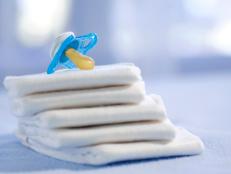How to Make Your Own Baby Food
It’s easier than you think.


monzenmachi
Soon after Prince Harry and Megan Markle’s baby boy was born, the media went a little nuts over the fact that Markle might make her own baby food. Though it may sound far-fetched and ridiculous for a jet-setting princess, who knows? Maybe she will whiz up a batch of pea puree. Regardless of whether you are royalty or a commoner, the fact is that making your own baby food is super simple, good for the environment and easy on the wallet.
The American Academy of Pediatrics recommends starting babies on solids at around 6 months, and the Mayo Clinic advises introducing fruits and veggies slowly with instruction to, “offer single-ingredient foods that contain no sugar or salt. Wait three to five days between each new food to see if your baby has a reaction, such as diarrhea, a rash or vomiting. After introducing single-ingredient foods, you can offer them in combination.”
Even those who don’t know a colander from a fine-mesh sieve can steam a bag of frozen organic peas or carrots, strain them, put them in a blender and press the puree button. Another super-easy option is to roast sweet potatoes or butternut squash, scoop out the flesh into a blender and blitz. If your creation is too thick, add a bit of filtered water. Freeze it in single-serving containers like these and voila! You have leveled up in parenting.
Do note, however, that the Mayo Clinic says these foods are off limits for babies less than 4 months old due to a high level of nitrates: spinach, beets, carrots, green beans and squash.
For parents who enjoy shopping at their local farmer’s market, prices may make the process less cost-effective than buying bags of frozen fruits and vegetables, or fresh produce from the grocery store; however, it does up the eco-friendly aspect of making your own baby food because the fruits do not often come in single-use plastic.
As for grocery store prices, many sell 2.5-ounce jars of non-organic peas for $1 and 16 ounces of organic frozen peas for $2.50. When you consider that it will take you less than 10 minutes to make pea puree yourself, that’s a pretty significant saving. For more time-consuming produce, put your trendy Instant Pot to work to cut down on how long it’ll take to cook them.
Another benefit to making your own baby food is that you know exactly what your baby is getting, and eventually their diets can move beyond strained peas and carrots. Making your own allows you to squeeze in less mundane produce like figs, dragon fruit and parsnips. In fact, when you’ve got the single-ingredient baby-food thing down pat and your baby is ready for the next stage, consider graduating to interesting combos like squash, apple and carrot, or beet, mango and cauliflower. In fact, you can find 50 creative combos to kickstart your imagination here.
Happy cooking!















